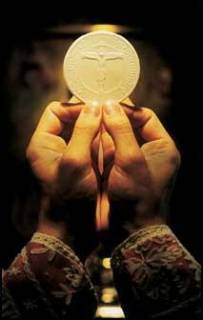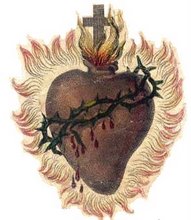Raymond Arroyo, who many of you might know from EWTN's news program The World Over, penned this fine op-ed piece, The Language of Tradition, for the Wall Street Journal. I think he gets to the root of the Motu Proprio, and what is hoped for by its release from all who appreciate the document.
It's not about language, as one commentator put it, it's about tradition, and maintaining, as Cardinal Ratzinger said, the truth that "what at one time was holy for the Church will always be holy." I pray that this is the first big step to a broad and wide liturgical renewal that is truly in tune with the heart and mind of Christ and His Church.
This form of the Holy Mass is not for (as widely said and believed,) 'right-wingers', 'ultra-conservatives', or those who reject Vatican II. (It was the Mass said at the opening and closing of the Council!) It is for all Catholics as part of their patrimony, and indeed for the whole Church, that we might flow with the stream of holy tradition and, in the heart of the Church, practice the hermeneutic of continuity that Pope Benedict speaks of so beautifully.
God love you!
Father V.
************
The Language of Tradition
The pope brings back the Latin Mass.
BY RAYMOND ARROYO
Friday, July 13, 2007 12:01 a.m. EDT

While drafting the decree that would return the old Latin mass to Catholic altars around the world, Pope Benedict XVI rightly predicted that reaction to his directive would range from "joyful acceptance to harsh opposition." But what he did not anticipate was the reaction of pundits and not a few clerics who have tried to dismiss the decree as a curiosity--a nonevent that is likely to have little effect beyond a few "ultraconservative" throwbacks. David Gibson, the author of "The Coming Catholic Church," says that the announcement is "much ado about nothing," and French Cardinal Jean-Pierre Ricard says that he doesn't "see a tsunami coming." But there is much more at play here than satiating the liturgical appetites of a few traditionalists.
The legislation (made public on Saturday) allows a pastor, on his own authority, to celebrate the Tridentine Mass, codified in the 16th century. Following the Second Vatican Council (1962-65), the venerable Mass--in which cries of "sanctus, sanctus" rose like incense around the altar--fell out of practice. It was actively suppressed in some quarters--though never outlawed by the church. Pope John Paul II encouraged celebrations of the old rite in a declaration he issued in 1988, although the permission of the local bishop was required for a priest to offer it. This new legislation removes the middleman and puts the Latin Mass on a par with the widely celebrated vernacular Mass. In the words of the pope, these Masses constitute "two usages of the one Roman rite."
It is an open secret that many in the Roman Curia (including top Vatican officials) were opposed to the decree. Bishops in Germany, France and England grew angry over the prospect of reviving the old Mass. British Bishop Kieran Conry said that "any liberalization of the use of the [Latin] rite may prove seriously divisive. It could encourage those who want to turn back the clock throughout the church." According to several prelates I have spoken to, Bishop William Skylstad, the president of the American Bishops Conference, flatly told the pope that the U.S. bishops opposed any revival of the old rite. Why would the pope risk alienating so many of his own churchmen to appeal to a relatively small group of "disaffected" Catholics?
Reform of the liturgy has been a central concern for Pope Benedict for decades. Disgusted by some of the liturgical experimentation he witnessed in the past few decades, the pope suggested in a letter to the bishops (issued along with the decree) that these "arbitrary deformations of the liturgy" provoked his actions. There is little room for such tomfoolery in the old Mass, whose focus is on the Eucharist and not on the assembled or the celebrant.
During an interview I conducted with the pope in 2003, before his election, he said of the Latin Mass: "[What] was at one time holy for the church is always holy." He also spoke of the need to revive the "elements of Latin" to underscore the "universal dimension" of the Mass. Before Vatican II, a Mass celebrated in New York was identical to the Mass celebrated in Israel. That is not true today. For a faith that crosses borders and cultures, common language and practice in worship are essential signs of unity.
The pope's decree also underscores for Catholics the origins of the new Mass and the continuity of the two rites. Pope Benedict tells his bishops that as a result of his decree, "the celebration of [the vernacular Mass] will be able to demonstrate, more powerfully than has been the case hitherto, the sacrality which attracts many people to the former usage." By placing the two Masses in close proximity, the pope is hoping that the new Mass will take on the sensibilities of the old. The pope is betting that sacrality and reverence will win out over innovation and novelty, no matter which rite people choose.
There are inevitable problems: Many priests today simply don't know Latin. But they can learn it, or at least enough of it to get through the Mass. The movements of the traditional rite can also be gleaned from older clergy and from groups like the Fraternity of St. Peter that offer intensive instruction in the ritual. Just as the laity have grown accustomed to the incessant hand-holding and hand-shaking that make the Mass look like a hoe-down, they will learn to embrace the gestures of the old liturgy. Parishioners can actively follow the Mass using a Missal, which usually provides side-by-side translations. Listening with attention will be required. But who said worshiping God should be effortless?
Since Vatican II, generations of Catholics have participated in Masses and repeated actions that they have no historical appreciation or understanding of. This move by the pope will not only provoke a healthy conversation about why Catholics do what they do but ground them in the beauty and meaning of the liturgy, both new and old.
Mr. Arroyo is the author of "Mother Angelica" and news director of EWTN, a Catholic broadcasting network.







